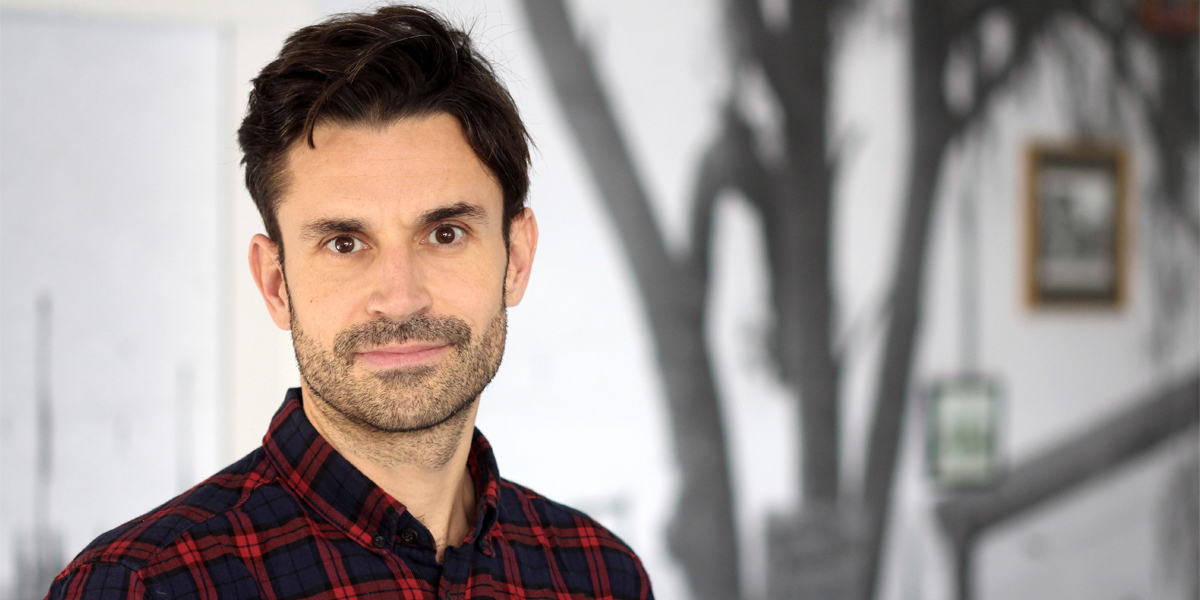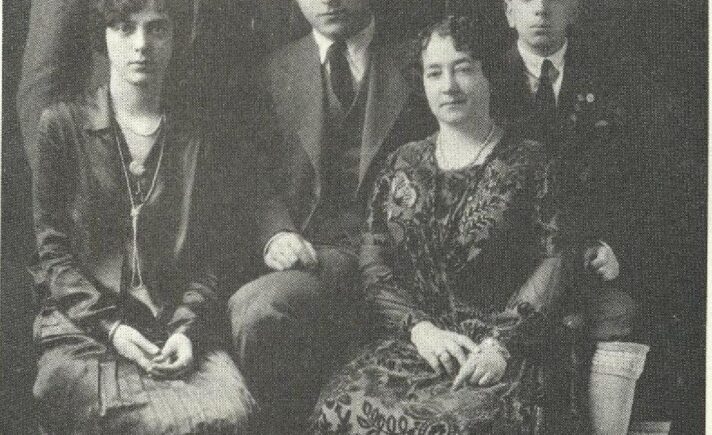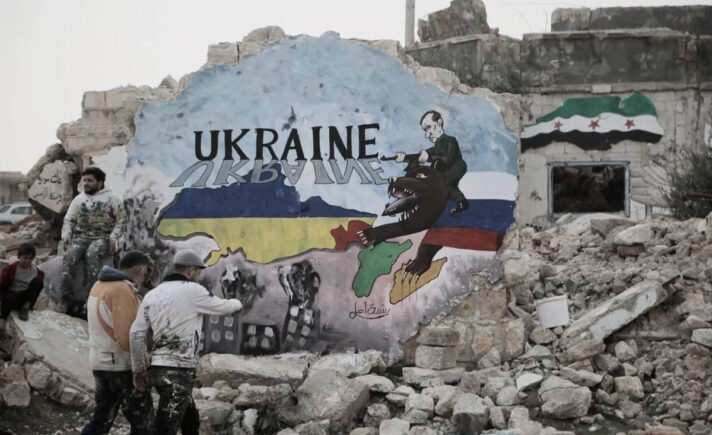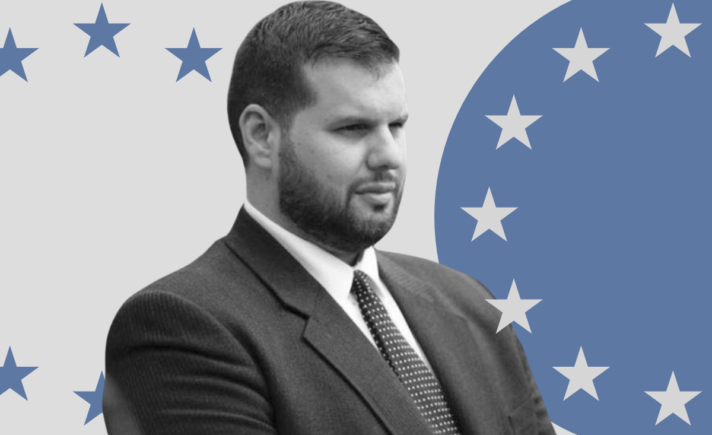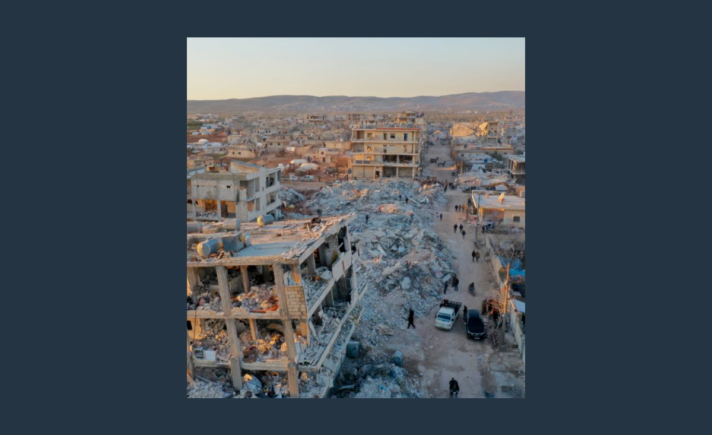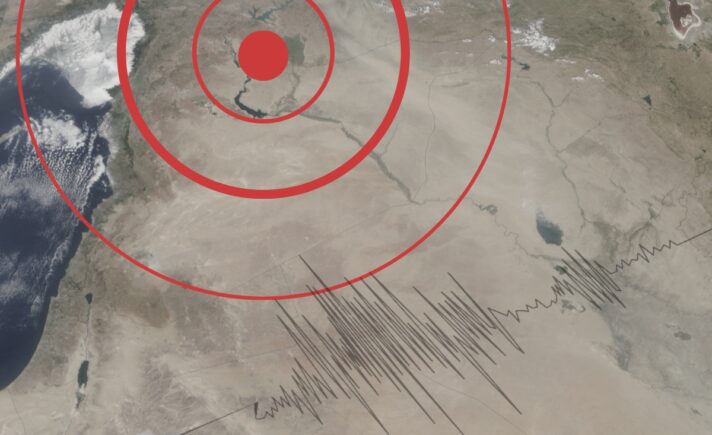In the small German city of Koblenz, at the intersection of the Rhine and Moselle rivers, half way between Frankfurt and Bonn, a landmark trial of historic significance for the Syrian conflict has been underway since April.
Colonel Anwar Raslan, the former head of investigations at the Syrian regime’s “Branch 251” detention center in Damascus (better known as the “Khatib Branch”), faces multiple charges of crimes against humanity, murder, and torture. Alongside him in the dock is his former colleague at the Branch, Eyad al-Gharib. As Al-Jumhuriya has previously reported, the trial has already seen harrowing first-hand testimony of mass burials of inmates tortured to death in the Branch, revealing systematic killings on a scale more extensive than ever previously documented. It is the world’s first prosecution of Syrian regime officials for crimes against humanity; human rights lawyers hope it will not be the last.
One such lawyer is Dr. Patrick Kroker, a Syria specialist at the European Center for Constitutional and Human Rights, who currently represents nine of the victims of the acts attributed to Raslan and al-Gharib. On 1 December, Kroker spoke to Al-Jumhuriya via Zoom from Koblenz shortly after the day’s trial session had concluded. Below is a condensed transcript of the conversation, edited for clarity and readability.
Al-Jumhuriya: Your official role in the court proceedings is “representative of joint plaintiffs.” For readers who might not be well-versed in legal and judicial terminology, could you clarify in lay terms what that actually means? You represent the victims, but are not a member of the prosecution or defense?
Dr. Patrick Kroker: That’s correct […] next to the public prosecutor, you have “civil parties” in the case, [which] basically means another party to the proceedings. […] It’s kind of understood that [we] join the case on the side of the prosecution, but we are a party in our own right, and we have different procedural rights.
Al-Jumhuriya: If your aim is neither to prosecute nor defend, what is it? To get the best deal for the victims, in terms of compensation, for example?
Kroker: Well, good question. That’s actually how it was perceived in the French system […] But it depends on the clients, of course; what they want. Sometimes it might be aligning a lot with the prosecution. Sometimes it might be completely different; it might be to shed light on other aspects than what the prosecution wants. It’s hard to imagine a case where it’s close to the defense. The only question is how close to the prosecution you are, and I would say we are, in some instances, close, of course, because we are also working for a conviction of the accused. Because we strongly believe that he is responsible […] for what he has been indicted for.
But, to give you an example where our opinions differ, we held a motion last week to include sexual violence crimes as a crime against humanity in the indictment, whereas the prosecution has indicted these crimes only as kind of “normal” [crimes] so far.
Al-Jumhuriya: How has your general assessment of the trial been so far? Has it gone as hoped and expected, or is it falling short in certain aspects?
Kroker: Well, there’s one aspect in which the indictment, at least, fell short of what I really believe is going on in Syrian detention facilities, and that’s what I just mentioned; the question of sexualized violence, which is in my opinion clearly part of a widespread and systematic attack, and therefore also a crime against humanity. But overall, I think we can say that the trial has gone very well so far.
When it comes to the perspective of our clients, the main point for them is not [only] to have a conviction in this very individual case of the main accused, Anwar R., but to really shed light on the overall situation and the overall crime against humanity by torture in Syrian detention facilities. And this is basically reflected in everything that happens in the trial, and we have had really, really strong evidence so far, and also documentation for the wider truth-seeking process, I would say. And this is really important for all our clients. This system of torture and detention is so much about disguising what’s actually happening, of not letting information get out, et cetera. And here we have the opposite: […] If you imagine this dark dungeon of a torture prison, we have brought some light, at least, into that.
[…]
We have had some insider witnesses, who testified about how the system works, and very concretely stating how the main accused was also part of that […] Also very, very impressive—in a shocking way—[were] the Caesar photos,
[…]
And, of course, the two accused themselves, who have also given some information about their role in the system; not in this trial, but to the police. This has been introduced by hearing the policemen who did the testimony with them at the time as witnesses here in the trial.
Al-Jumhuriya: On that specific point that you raised about sexual crimes and the difference you had with the prosecution, what is the current status of that? Will the judge now determine whether that’s to be incorporated?
Kroker: Yes, exactly. It was a motion that we filed to the court. The other parties, including the prosecution, can now see if they want to join that action or […] contradict it. And then it will be ultimately decided by the court what they do with it.
Al-Jumhuriya: OK. To make a quick comparison, which may or may not be a relevant one, and perhaps you’ll comment on the extent of its relevance […] We saw, in Lebanon, with the recent verdict at the Special Tribunal for Lebanon; specifically the “Ayyash et al.” case, which centered around the assassination of Prime Minister Rafiq al-Hariri; the verdict came out in August, and there was quite a significant amount of disappointment among the general public when, in the end, only one of the four accused was convicted. And he was a relatively low-level Hezbollah operative, with no convictions of any more senior figures, whether within Hezbollah, or within the Lebanese security apparatus, or indeed within the Syrian regime, which was also widely suspected of involvement at some level. Adding to that disappointment was the fact it had taken fifteen years, and around $1 billion in expenses, to arrive at that verdict. And the convict was not even arrested; the entire trial took place in absentia. So there was this widespread and deep sense that this was not only a disappointment for Lebanon, but a blow for the very concept and enterprise of international justice itself. That, even with the full weight of the UN and the international community, and fifteen years and $1 billion spent, the best prosecutors in the world were unable to do more than convict this one person, who plainly could not have planned and carried out so incredibly sophisticated a plot as that all by himself. And who has anyway, in effect, escaped justice, because he’s presumed to still be living as a free man somewhere in Lebanon. Do you worry there is a risk that something similar could happen in Koblenz? That public expectations will be so out of sync with the reality of what actually might end up happening, even in the event of a successful prosecution, and that this will lead to an inevitable disappointment and disillusionment with international justice among Syrians and among others? How can such expectations be managed appropriately, without at the same time diminishing the significance of the trial and undermining the importance of legal accountability?
Kroker: That’s a good, and a very big, point, because it goes to the very legitimacy of these international trials and tribunals. I would still [say] there are a lot more differences with the Lebanon tribunal than there are similarities with what is happening with Syria. So we can only draw relatively [few] conclusions or comparisons between them.
[…]
It’s very important to keep one thing in mind. Criminal accountability is, I think, key in any of these processes, and still it has to be administered in a correct way. With the Lebanon tribunal […] I know there were so many problems that the question of whether it even delivered some truth about what happened; did it appoint some kind of responsibility, and so on and so forth; you said it didn’t deliver that, and I think that in the trials in Syria, or especially in this trial, my belief is that it will be slightly different. One thing that was, for example, presented just two weeks ago here in court was an order by the central crisis management cell—the highest echelons of power in Syria, that directly reported to Bashar al-Assad—ordering basically all the facilities that belong to the mukhabarat [intelligence] system in Syria to crack down on protests. By all means necessary. That’s not a quote from the order, it used different words, but everyone who understands the reasoning of that system knows that it means that.
Or, [to take] one quote just from today’s testimony, which I still have in mind, [from] a witness […] who also talked about the chain of command. He said, “On top of everyone there was God, and God decided.” And then the judge asked, “Well, does God have a name?” And he laughed, and said, “Yes, of course, it’s Bashar al-Assad.” So it is really appointing responsibility, I think, all the way to that level.
Nevertheless, it will always be a very small fraction of crimes that can be dealt with by international criminal law […] How could it [not] be? It’s a conflict that’s lasted for almost ten years, crimes that have been committed in the several thousands, if you can even quantify them, so of course it will always be very selective. But it can have a triggering effect. And this is what’s important; that this is taken up and used, not only by other judiciaries and other lawyers to bring more trials and suspects to justice, but also by civil society in general; in political fora; by media; by arts; education; history writing; and so on and so forth. I think a trial can do that. And there are few other institutions in society that can serve as that, because [in a trial] the truth is being debated, and you have the court. I mean, we have seven judges sitting there. Seven! Of the highest [qualified] judges in Germany. And they will assess every word that is being said over years in this trial. And when they have a verdict, it is really something that has been deliberated about quite a lot, and that can be read and understood elsewhere.
[…]
We have already had artists here from Syria who did exhibitions that were really powerful. Movies will be made. And so on. [The hope is] that this triggers something, so that this is not forgotten or [swept] under the carpet. I think that’s really where the big impact lies.
Al-Jumhuriya: Regarding the selection of witnesses at Koblenz, are you able to talk a little about the mechanism by which witnesses are found and selected?
Kroker: For a long time, anybody who had information on that branch that is the subject of the trial here; namely, the Khatib Branch in Damascus; and who turned towards the prosecution authorities, to the investigative authorities, was being heard as a witness.
Al-Jumhuriya: Whose job is it to find witnesses, and decide on the list, and bring them to court? The prosecution?
Kroker: Yes, that’s the prosecution, but of course they cooperate with lawyers. They sometimes, or very often, don’t have the connections; people don’t trust them; they don’t want to talk to them; they feel more comfortable talking to a Syrian lawyer first, then maybe a German lawyer who can counsel them. Because in almost every case, there is an issue of security, family in Syria, and so on […] many cases do not go forward without civil society engagement, by Syrian lawyers and activists and, in this case, their German partners.
Al-Jumhuriya: If someone wished to come forward themselves now and offer testimony, would they be able to? How could they go about doing that?
Kroker: They could basically go to any police station and say that they have information about this, and it would be put on record and then sent to the prosecutor. [But] by now, the question is how many are they still able to process, or would they say, “We have enough for this case.” That I cannot answer […] If somebody knows something direct about the crimes here, then it’s likely they would still be called to testify.
[…]
I do always counsel people to contact a lawyer before. So that the lawyer can tell them, “This is what will happen, you have the right to do this, you have the obligation to do that.” Because being a witness is actually not a choice. If the court knows that you witnessed something, they can call you as a witness, and then it’s your duty to say what you know. And the reasons to [refuse] are quite limited by law. So what many people [misunderstand] is that they cannot pick what they want to say and what they don’t want to say. So that’s why it’s always advisable to speak to a lawyer before.
Al-Jumhuriya: From your perspective as a lawyer, how would you rate the media coverage of the trial so far? Have there been any particularly problematic misunderstandings or mischaracterizations?
Kroker: I think the communication by the court has not really been satisfactory, because it’s been quite difficult for people to follow, especially Arabic-speaking persons who don’t understand the trial in German. Because the only language that you hear in the public gallery is German. Unless a witness speaks in Arabic, [then] you can hear that witness, but you wouldn’t hear the questions, et cetera. And we have tried to raise that; that the translation should also be available for the non-German-speaking public; and the court here has basically denied that request. Also, some academics wanted to have the trial recorded for historical purposes, basically, and that request was also denied. And so I think it was a missed opportunity […] because you have such a big part of the population, namely Syrians, who cannot access detailed information about this.
Al-Jumhuriya: So the session that you attended today, for example, how much of that is accessible as public information?
Kroker: None.
Al-Jumhuriya: None?
Kroker: None. First of all, there are no transcripts. So the only way to get information about what’s really happening in the court is to sit in the public gallery and listen to it. And this you can only do in German. Not even in Arabic […] I’m sure [if there were Arabic translation] then more people would come and listen to what’s happening.
Al-Jumhuriya: The trial has been variously described as “historic,” and a “first of its kind,” and other terms like that. What do you think will ultimately be its long-term impact, if any, beyond the immediate consequences for the specific defendants? What will it be remembered for; what will it change?
Kroker: Well […] we still don’t have a verdict, and there might be another trial that’s faster, but I think it will be the first verdict against Syrian intelligence services for crimes against humanity by torture against civilians in Syria. Of course, we [already know] this from numerous UN bodies, international organizations, and NGOs […] but I do think that a trial verdict carries a different weight. I think this will be a lasting impact. Such a verdict doesn’t just go away […] I think this will also influence the historical perception of what’s happening for the years to come.
But, even more than that, I hope it will trigger other kinds of justice mechanisms; that it becomes clear that, OK, we do have a verdict already […] Once that verdict stands […] then other courts, at least in Germany, will have a much easier time to prove that. Because they don’t need to go through all these details […] they can say, “OK, and for that part, we’re going to read out now the verdict of the court in Koblenz,” and then it’s basically already stated fact.
And I hope this also triggers […] a rethinking of how much you really want to be engaged with such a government, now that many governments are thinking about normalization, et cetera. And that it will also trigger justice processes to be an example also for more Syrians to come forward, and especially more prosecutors to indict more people, or to pass more arrest warrants against higher-level suspects.
Al-Jumhuriya: On that point exactly, one often hears a sort of vague, hopeful talk of future prosecutions. Are you aware of any specific examples of prosecutions that are in the works that may come to fruition in the next few years?
Kroker: Yes, there’s one against a doctor from a military hospital in Homs, “Alaa M.” Also in Germany. He’s been arrested; the case has been reported in the media; and so this is very likely to be indicted rather soon, [as he is] somebody from the same system, military intelligence.
Then, I don’t know of any more cases that are directly in the pipeline, but I’m quite sure they will come. But for cases to come to that level, the suspects need to be here, present, so that they can be indicted. At least in the German legal system, and in most legal systems in Europe. But I still hope there will be more arrest warrants, also, against people who are not present. Then, you cannot put them on trial, but still you can have the hope that one day they will be caught by the net, if you have an international arrest warrant, and INTERPOL is aware. Maybe even in five years, somebody like [former air force intelligence director] Jamil al-Hassan will want to travel to Sweden to go shopping, or who knows what for, and might be arrested. I think it’s important that this continues.
Al-Jumhuriya: Recently, there was this wild story of the Syrian regime general, Khaled al-Halabi, who it emerged had found himself in France, and was denied asylum, and so—according to the reports—he was smuggled to Austria by Israel’s Mossad. It was like the plot of a Netflix series. And you commented on Twitter that this was a great blow to efforts to hold such figures to account. Do you have hope, now that the story has come to light, and he’s been exposed, that the Austrian authorities may change course?
Kroker: I hope so. And I hope it’s not too late to do that, you know, because I’m not sure if the fact that it has been reported increased the chances of that case going forward or decreased them. Because the person, if he’s still available, might be running away. So I’m not sure in which way this turns out. I think it’s still right to expose that, because it’s just a huge scandal that this is happening […] Justice for these crimes is something that you cannot negotiate […] This is something that should not be done. This is dirty business, if you want to believe those [reports], that these secret services have done. I think it’s important to expose that and to not let these people get away with that [just] because they hold whatever kind of power.
Al-Jumhuriya: Finally, you have sat in the room during these court proceedings. On a purely personal level, setting aside your role as a lawyer, just in sheer human terms, what is it like to sit in the same room and breathe the same air as a man like Anwar Raslan? Particularly when some of his victims are also sitting in that same space?
Kroker: By far the more powerful personal experience is what you also mentioned; namely, to be there with these people who have suffered. I think that’s really with whom I identify more. The accused are sitting there, and I’m thinking, “OK, this is going to be a fair trial, that’s what I want, at least. We will assess what they have done,” et cetera. But I felt a lot stronger on the very first day, for example, when the indictment was read out, and there were so many stories; individual stories; summaries of witness testimonies; and so many of these people I know, and I heard their stories. Sometimes I have sat there with them when they gave their testimony to the prosecutors.
This is finally happening. And the accused, at the same time, has to sit there, after being asked, “Can you understand everything? Do you understand the translators? Does everything work? Can you understand every single word?” “Yes.” And then he had to listen to, you know, one and a half hours of this being read out to him.
Or when the Caesar photos were shown, and we saw hundreds of images on that day, and behind each of these images is an individual story of somebody knowing that their relative has been tortured to death. All this is a very powerful experience, I must say, and also not an easy one […] I’m kind of automatically imagining what must it be like for the people. We see a dead body on the screen, tortured to death, starved to death; this is somebody’s brother, sister, and so on. [This is] not easy, but at the same time, of course, [it is] the very reason why I’m very much engaged in this work […] to establish a verdict and historical record and to work for this to stop and for people to be held accountable.
Al-Jumhuriya: What about the defendants; is there anything you can read on their faces during those moments, when the photos of corpses are being shown? Do they give any indication of remorse, of being moved in any way, or is it a stone-cold poker face?
Kroker: No, when this moment came, I didn’t see a lot of reaction, I must say. Anwar R., the main accused, is most interested when people are testifying about how the system worked, basically. What he knows well and what he has been part of for decades; if people talk about that, then he gets really interested, and if he thinks that something is wrong there—although it might not be relevant to the indictment—you can see that it arouses him and he talks to his lawyers, and, “No, that’s not who I was reporting to”—I’m just giving this as an example, because I don’t know what he’s saying. This is something that really makes him have a reaction. Not so much when there are stories of suffering that are being told.
But as somebody said to me [at the time], “Well, he’s the only one that has probably seen the scenes in reality.” Already then it must have been much more […] difficult, so there must be a way for him to be able to deal with it then, so probably also today.
Al-Jumhuriya: Thank you so much for your time, Patrick.
Kroker: Thank you.


